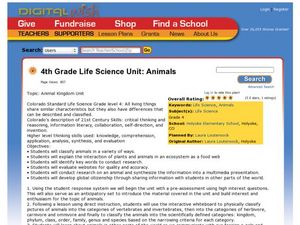Curated OER
What's Down There?
Investigate the coral reefs around Mokolai Island, Hawaii by researching and writing about improving the reef ecosystem. Students map threats to the ecosystem and use the list of key words to assist in their descriptions
University of Minnesota
Manduca sexta: Caterpillar Dissection
Caterpillars have an amazing, yet tough job to perform in their short lives — eat much, avoid predators, and try not to let all those comments about being the unattractive stage of the life cycle get to them. How do they handle it all?...
NOAA
Deep-Sea Benthos
Much like a distant planet, the underwater world of deep-sea benthos is strange and largely unknown. How do creatures survive and thrive in such extreme pressure and temperature conditions? Young oceanographers join the crew of Operation...
NOAA
Importance of Deep-Sea Ecosystems – Chemists with No Backbones
Marine invertebrates offer us many new options for developing pharmaceutical drugs, such as w-conotoxin MVIIA, which is extracted from the cone snail and is a potent painkiller. The instructional activity encourages scholars to research...
Curated OER
Pond Ecology
A lab activity is a great way to incite thoughtful questioning and scientific processes. Pupils will collect organisms with a Petri dish, make observations, sketch the organism, ask questions, then attempt to identify the specimen...
Curated OER
Bug's Eye View
Investigate the life of bugs and how they interact with the environment in this integrated science and language arts instructional activity. Young scientists construct mini environments in cages in order to make observations. This data...
Curated OER
Instruments From Around the World
How much does the environment affect how and what man creates? Children explore the effect of the environment on primitive man as they research raw materials from a specific location. They use their findings to write a short essay about...
Curated OER
Design a Reef!
Using a miniature coral reef aquarium kit, young ecologists model this unique ecosystem. They research various coral reef organisms and their niches, and they culminate the project by working together to write a report. Use this activity...
Curated OER
EEEK! A Spider!
Youngsters complete a unit of lessons based on the story "Little Miss Muffet." They predict what will happen in the story, and use context clues to look for meaning in the words. They research information about spiders using the Internet...
Curated OER
Comparative Embryological Study of
Students complete two labs. They observe the fertilization and development of sea urchin and zebrafish embryos. They examine the similarities and differences in the development of an invertebrate vs. a vertebrate animal.
Curated OER
The Benthic Drugstore
Students identify at least three pharmacologically- active chemicals derived from marine invertebrates. They describe the disease-fighting action of at least three pharmacologically-active chemicals derived from marine invertebrates.
Curated OER
What Lives In A Shell?
Second graders study the readily observable characteristics of marine invertebrates, 2nd graders research the invertebrates and complete worksheets in this series of lessons.
Curated OER
Hide and Seek Science
Young scholars examine macro-invertebrates in order to better understand their link to the food web. Working in groups, they record observations of several areas of a stream or river, collect samples from the river bottom, and identify...
Curated OER
Pond Ecosystem Field Trip
Students investigate the environment by participating in a class trip. In this pond ecosystem lesson, students define a list of vocabulary terms associated with ponds such as invertebrate and metamorphosis. Students attend a field trip...
Curated OER
Down in the Dumps
After an introduction to municipal sludge, middle school ecologists consider the pros and cons of dumping in the Hudson River Canyon. The class is split into two groups: one to debate in favor or dumping and one to debate against the...
Curated OER
Home Sweet Home
Learners explore marine turtle habitats. Students research one species of marine turtle found in the Gulf of Mexico. They identify plants and animals in the habitat. They create a model or replica using information gathered through their...
Virginia Department of Education
Animal Phyla and Plant Divisions
Searched hours for an activity that allows individuals the ability to use multiple resources to learn about both plant and animal kingdoms? This discussion and activity provide pupils with the ability to visualize each organism before...
Curated OER
Art: Go Ahead and Bug Me!
Pupils research arthropods, and identify the differences between vertebrates and invertebrates. After comparing and contrasting insects and arachnids, they create drawing of them that are anatomically correct. Students place their...
Curated OER
Blue Planet: Seasonal Seas
Students study and research marine invertebrates. In this marine lesson students create an illustrated report and help complete a class exhibit.
Curated OER
Blue Planet: Seas of Life - Tidal Seas
After viewing the video Blue Planet: Seas of Life, students review oceanic concepts. In this earth science lesson, students reflect on the effect tides have on living things and conduct research to create a "tidal trivia" game. Students...
Curated OER
Blue Planet: Tidal Seas
Young scholars investigate how tides affect sea life. In this video based lesson plan, students view a video on how tides affect sea life. They do web-based research to find the answers to a series of questions and then play Tidal Trivia...
Curated OER
Focus on Food Chains
Third graders collect and analyze data about food chains. They conduct Internet research about the habitat of a selected organism, write a narrative, and create a computer slideshow using Kid Pix computer software that illustrates the...
Curated OER
Pollinator Habitats
Students read and discuss background information included with this lesson plan. They brainstorm the best sources for developing a list of native or migratory pollinators. Students work in groups to design habitats based on information...
Curated OER
4th Grade Life Science Unit: Animals
Fourth graders classify animals. In this animal kingdom lesson, 4th graders research animal habitats and behaviors. Students connect to a zoologist via SKYPE and learn about animal classification. Students blog about preserving animal...

























